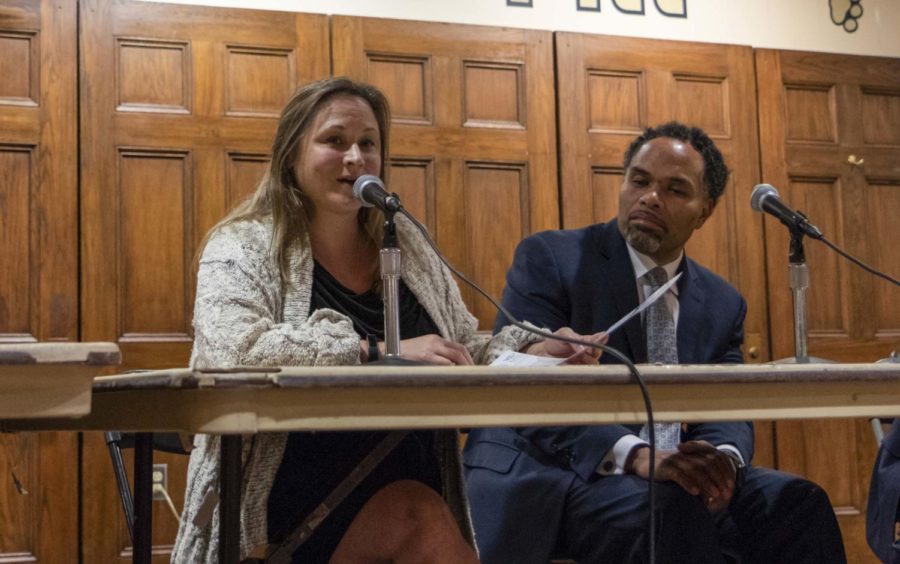Counseling Center leaders talk mental health at SGB town hall
Michele Welker of the Office of Sexual Harassment and Assault Response and Education answers a student question while Univeristy Counseling Center Director Jay Darr listens. SGB replaced their normal meeting with a mental health town hall.
October 9, 2019
In honor of Mental Health Awareness Month, Student Government Board replaced its regular public meeting this week with a mental health town hall, where four Pitt health professionals answered questions from students concerning mental health and resources provided by the University.
The featured professionals were Wellness Center Executive Director Marian Vanek, Office of Sexual Harassment and Assault Response and Education Coordinator Michele Welker, Associate Dean and Residence Life Director Steve Anderson and Counseling Center Director Jay Darr. Most of the questions the panel answered were concerned with issues the Counseling Center faced in the past, including criticism from the last academic year for several-week-long waits due to high demand. Darr recently announced that starting in October, there will be 24 senior-level staff members as well as 11 master’s- and doctoral-level trainees. In April, the staff consisted of 20 clinicians and seven trainees.
Though he noted there was currently no wait, SGB member Eric Macadangdang asked how the Center will handle and prepare for a possible influx of students.
Darr said new outreach programs, an attention to efficiency and more clinicians will help with the volume of students seeking help.
“How we plan for that, there [are] a couple of things,” Darr said. “One, gain efficiency in our processes. The other thing is, as we gain efficiency, putting clinicians during those times where we have high volumes, particularly on our drop-ins.”
But Welker said the Center is pushing to try and meet students “where they’re at” through several different outreach programs, rather than requiring students to go to the Center.
The Center holds “Let’s Talk” chat sessions several times a week around campus to allow for students to talk with counselors about their concerns, get help problem-solving and learn more about consultation, counseling and referral services.
“They’re 15-minute chat sessions, very solution-focused to meet students’ needs,” Welker said.
Welker also said the Center is focusing on reaching marginalized groups of students who may not feel as comfortable seeking help at the Center, largely through the “Let’s Talk” chat sessions. She cited a recent “Let’s Talk” chat session held at the University’s Disability Resource Office as an example.
Welker also brought up the recent addition of three clinicians in Litchfield Towers, as well as Sutherland and Lothrop halls, as a part of bringing help directly to students. Lothrop’s clinician will be located behind hall security, but any student will be able to talk to Sutherland and Towers’ clinicians without having to swipe in.
SGB member Scott Glaser asked how those who may not be struggling with mental illness can be better allies to those who are. Welker responded by saying it’s important to be an “active good bystander” and reach out to people in our lives we think may be struggling.
“We as human beings are often afraid to name that experience and what we’re observing in our friends and loved ones,” Welker said. “But doing so and reaching out in that way can be really impactful and meaningful, so I really encourage you to really just state the facts and state what you’re observing in your friend.”
After the town hall, SGB President Zechariah Brown provided an update on the ongoing effort to preserve the names of independent student organizations in the wake of updated Student Organization Resource Center naming guidelines.
SORC announced in late August that beginning fall 2020, its registration guidelines would prohibit the names of independent student organizations from including University trademarks or wordmarks like “Pitt” and “Panther,” instead encouraging clubs to use phrases such as “at Pitt” or “at the University of Pittsburgh.”
A student task force, comprised of representatives from SGB and several clubs, met Sept. 29 and rejected SGB’s initial proposal to create a tiered system of student organizations.
Brown said the board’s latest proposal is to grandfather current organizations that have been on campus longer than the pre-existing, approximately decade-old naming guidelines have been in effect. All remaining organizations would have to change their names, but would be allowed to sell any merchandise they have already purchased to try and prevent any large financial losses.
“A lot of what we’ve tried to do with this process is not only focus on one group — students or admin — but try to meld together the different perspectives,” Brown said.
SGB will be meeting with University administrators on Thursday to share the proposal and discuss its viability. Brown said he has been in contact with administrators, including Vice Provost and Dean of Students Kenyon Bonner, and they seem open to his proposal.
“These changes seem favorable,” Brown said. “I don’t anticipate a negative response.”
Allocations:
Lady Panther Lacrosse requested $18,882 for costs related to their Golden State Tournament in Los Angeles. The board approved $12,500 and denied $6,382.
Mock Trial Organization requested $1,281.46 for costs related to their Spartan Throwdown Invitational in Cleveland. The board approved in full.
Pitt Model United Nations requested $2,589.40 for costs related to their competition at Yale University in New Haven, Connecticut. The board approved in full.
Pitt Model United Nations requested $2,245.80 for costs related to their competition at the University of North Carolina in Chapel Hill. The board approved in full.
The Society of Hispanic Professional Engineers requested $2,165 for costs related to their national conference in Phoenix. The board approved $1,781.75 and denied $383.25.








